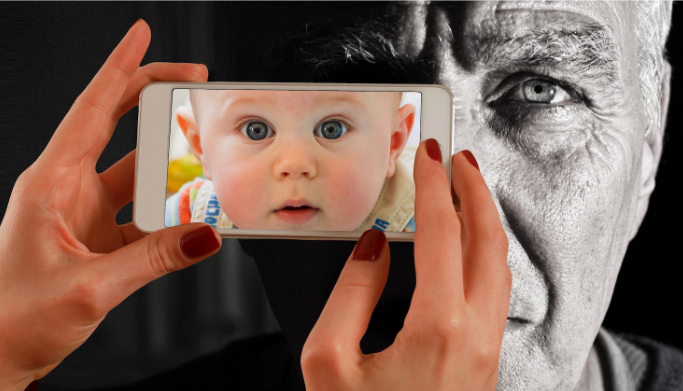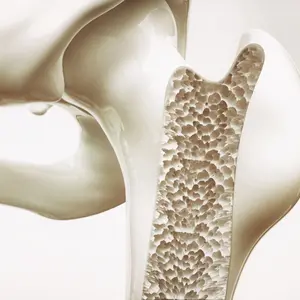

WELLthier Living and Aging

WELLthier Living and Aging
Amazing Evidence Shows You Can Turn Back the Clock on Biological Age
Wouldn’t it be awesome if you could magically grow younger—or reverse your biological age?
Impossible, right?
Maybe not.
According to a recent study, after men adopted certain lifestyle changes, their DNA acted two years younger.
Two years, after only eight weeks of change!
Interested? Read on!
What is Biological Age?
Before we get into the details of the study, let’s be sure we understand what we’re talking about here.
First, what is biological age?
The best way to understand it is to compare it to chronological age, which is how old you are depending on your birth date. This is the age measurement we normally use when talking about our health.
But we all know that some people look young for their age, while others look older than they should. What accounts for that?
A lot of factors, for sure, but regardless, the truth is that some people don’t just look younger than their age, they are younger.
Huh?
This is where biological age comes in. Scientists describe it as how old our cells really are, which in a way, is a more accurate measurement of our real age.
What’s the Difference Between Biological Age and Chronological Age?
You don’t need any extra tests to determine your chronological age. As long as you know your birth date, you can figure it out.
Biological age, however, is a little harder to determine. A blood test can give us the information you need, as long as the lab tests for certain markers.
Let’s look at some of the main differences between these two types of age measurements.
|
|
Biological Age |
|
Doesn’t change. |
Can change depending on lifestyle. |
|
Based on birthdate. |
Based on the condition of DNA and genes, as well as on lifestyle factors. |
|
Not affected by anything you do. |
Can be changed depending on the choices you make. |
|
Affects disease risk based on how many years you’ve been alive. |
Affects disease risk based on the type of lifestyle you lead and the condition of your cells and DNA. |
|
Increases at the same rate for everyone. |
Depends on the individual. |
|
Can be used to predict mortality. |
Found in some studies to be a better prediction of mortality. |
How Does One Determine One’s Biological Age?
We know that chronological age is measured by the number of years that have passed since you were born. So how is biological age measured?
The key is to find out how much aging and damage has occurred inside your body throughout your lifetime. The goal, of course, is to have your biological age be lower than your chronological age, or at least for the two to be close to equal.
There are several different aging calculators that scientists have developed that can give you an estimate of your biological age depending on the results of a basic blood test. In general, they look at epigenetic aging and one of the factors influencing it, called DNA methylation.
What is Epigenetic Aging?
Epigenetics is an area of research that involves the study of how our behaviors and environment can affect the way our genes work. It’s based on the idea that gene function isn’t written in stone at birth. The choices we make in life can influence what our genes do inside our bodies.
It helps to understand your genome. This is your complete DNA. It tells the body which proteins to build to carry out a variety of functions in your cells. Your “epigenome” is made up of chemical compounds and proteins that attach to your DNA. They tell the DNA what to do—turn on or off, make this protein or that, etc.
When epigenetic compounds attach to your DNA, scientists say they have “marked” the genome. This changes the way cells read the DNA’s instructions.
Imagine your DNA and genome as the cookbook, and you are the markers. You decide which recipe to make, which ingredients to use from the list, how much of the recipe to make, etc.
Similarly, markers—and your epigenome—determine what to do with your genome at various times in your life. At one point, these markers may instruct the genome to read the recipe for fingernails to help them grow. Other times, it may tell it to use the ingredients to create a cancer cell instead.
A growing number of studies show that changes to epigenetic information accompany aging in our cells and have a huge influence on the aging process. In one 2016 study, researchers wrote that “rather than being genetically determined, our life span is largely epigenetically determined; diet and other environmental influences can influence our life span by changing the epigenetic information…”
An epigenetic clock—a term created to describe different types of epigenetic tests—predicts your biological age based on alterations in your DNA. One of the main markers scientists look for is called DNA methylation.
What is DNA Methylation?
Looking at it from a scientist’s point of view, DNA methylation is a biological process by which methyl groups (containing one carbon atom bonded to three hydrogen atoms) are added to the DNA molecule.
Okay, that’s confusing.
You can think of DNA methylation as one of the markers that can affect how your genome is read or used.
What matters to us is when these methyl groups are added, it can change the activity of that DNA segment. Simply put, it causes the gene to be switched “on” or “off.” It modifies the function of the gene and is a major factor in gene regulation.
It changes how the recipe is used.
DNA methylation affects various aspects of daily life, including embryonic development, genomic imprinting, gene suppression, chromosome stability, and more. Indeed, it is vital to healthy growth and development.
But scientists have linked abnormal DNA methylation to several adverse outcomes, including the development of cancer, Alzheimer’s disease, autoimmune diseases, aging, and more.
What Does DNA Methylation Have to Do with Biological Age?
If scientists see DNA methylation when looking at your blood test—and depending on where it shows up—they can estimate your biological age.
If 50 percent of cells from a sample show DNA methylation at one site on the genome, for instance, scientists can match that result with a specific biological age. Whether methylation exists or doesn’t in each site forms a pattern across a person’s DNA, and scientists use that pattern to calculate age.
According to a 2020 study, “It is currently well established that DNA methylation biomarkers can determine biological age of any tissue across the entire human lifespan, even during development.”
They go on to note that DNA methylation-based clocks can be used to determine early disease risk as well as life expectancy and mortality. Indeed, a biological clock called the “Horvath clock” is one of the most widely-used age clocks, It uses DNA methylation data to calculate age.

Other Ways to Determine Biological Age
DNA methylation isn’t the only way that scientists determine biological age.
In a 2019 study, for instance, scientists used what they called the “proteomic clock” to determine biological age. This method relies on measurements of levels of over 300 proteins circulating in the blood. They found that based on these levels, some people appeared younger or older than their chronological age.
But though there are other methods, epigenetics—and DNA methylation in particular—has been found to be accurate and reliable. In a 2020 review, scientists concluded measuring DNA methylation “remains the most promising epigenetic marker,” adding that it is highly stable, relatively easy to measure, and can track the influences of various environmental and lifestyle factors.
This was the method used in the study mentioned above.
Study Shows Lifestyle Habits Can Reverse Biological Age
It’s silly to think that you can reverse your age, right? You are as old as you are.
Except maybe not.
Some research has suggested that we may be able to reverse our biological age based on the lifestyle habits that we adopt.
In a recent 2021 study, for instance—mentioned at the beginning of this post—scientists found evidence to support this idea.
Here’s what happened: The researchers recruited 43 healthy adult males between the ages of 50 and 72. Then for 8 weeks, they put one group on a program that included:
- A healthy diet
- Proper sleep
- Exercise
- Relaxation guidance
- Supplemental probiotics and phytonutrients
The other group—the control group—made no changes.
After the 8 weeks were over, the researchers took saliva samples and tested them for DNA methylation using the Horvath clock.
The results showed:
- The diet and lifestyle treatment was associated with a 3.23 years decrease in DNA age compared with the controls.
- When comparing where they started and where they ended up, those in the treatment group decreased their DNA age by an average of nearly 2 years (1.96 years) by the end of the program.
- Those in the treatment program also lowered their mean triglycerides by 25 percent.
The researchers concluded: “To our knowledge, this is the first randomized controlled study to suggest that specific diet and lifestyle interventions may reverse [Horvath DNA] epigenetic aging in healthy adult males.”
Other Evidence Connecting Biological Age to Lifestyle Interventions
This study is particularly exciting as it showed such clear benefits of healthy lifestyle interventions when undertaken for a short period. Imagine the possibilities if we adopted these habits for a lifetime!
This study also shows a clear effect on the body’s DNA from lifestyle changes. Other studies have linked healthy lifestyle factors to a lower estimated biological age based on blood pressure, lung function, physical function, kidney function, and cognition.
But this study showed actual measurable effects on the body’s genes.
It will be interesting to see where this area of research goes. In the meantime, you may be wondering: Is it possible for me to reverse my biological age?
4 Ways to Potentially Reduce Your Biological Age
From what we know so far, it seems very clear to me that adopting certain lifestyle habits can not only help you age more slowly but may actually promote cellular repair and even reverse biological aging, as was shown in the study.
1. Eat a Healthy Diet
Yes, you hear it all the time, but this study shows that what you put in your mouth could be having more of an effect on your body and even your longevity than you may have realized.
Different people have different ideas when it comes to what makes up a healthy diet. I’d highly recommend you get tested to find out what sort of diet would be best for you.
In the meantime, here are a few general dietary guidelines for a younger you:
- Animal Protein: Studies continually show that red meat is associated with aging and age-related disease. Choose a low-animal-protein diet, and when you do eat it, choose grass-fed and organic sources of lean animal protein.
- Fruits and Vegetables: These are the key to aging well. They’re filled with antioxidants that neutralize reactive molecules that age you. Fill your plate with them and seek out a high variety of colors and textures.
- Healthy Oils: Oils with higher levels of healthy fats have been linked to anti-aging. In a 2016 study, researchers noted that olive oil contains oleic acid. This fatty acid is known to have the ability to modulate gene expression to slow the aging process.
- Probiotic Supplements: Probiotics help balance the microbiome, which can affect aging. In a 2017 study, scientists reported that the intake of probiotics may lead to the production of compounds that are protective against chronic diseases leading to aging.
- Green and Oolong Tea: These teas have powerful antioxidants linked with better aging both physically and mentally. Research published in 2019 showed that regular consumption of green tea was associated with successful aging.
- Sugar: The over-consumption of sugar and carbohydrates has been linked to aging. First, it’s associated with damaging collagen in your skin, which can make you look older. Second, high levels of sugar in your diet may increase blood pressure and heart rate and contribute to inflammation, insulin resistance, and overall metabolic dysfunction.
- Omega-6 and Omega-3 Fatty Acids: Though both of these can be good for you in the right proportion, today’s Western diet skews the balance toward omega-6 fatty acids and away from omega-3s. While a 2017 study showed that healthy brain aging was connected to a proper balance of these in the diet, other studies have connected a diet high in omega-6s (and low in omega-3s) to inflammation, heart disease, and Alzheimer’s disease.
2. Exercise Every Day
A lifetime of regular exercise slows down aging. These were the findings from a 2018 study. Scientists compared a group of older people who had exercised all their lives and compared them to a group of similarly aged adults and younger adults who didn’t exercise regularly.
The results showed that those who exercised regularly defied the aging process, having the immunity, muscle mass, and cholesterol levels of a younger person. They didn’t lose muscle mass like older people often do, and they didn’t increase body fat with age. The men’s testosterone levels also remained high.
In this study, the participants had all been amateur cyclists. They weren’t running marathons or otherwise behaving like star athletes. They were just doing something they enjoyed on a regular basis.
3. Get 7-8 Hours of Sleep Per Night
You may have noticed in the study we covered where the men reduced their biological age that they received medical guidance on their sleep habits.
Over the past decade or so, scientists have learned a lot more about how sleep (and sleep deprivation) affects age. In a 2015 study, scientists reported that just one night of partial sleep deprivation activated gene expression patterns linked with cell damage and biological aging.
“Our data support the hypothesis that one night of not getting enough sleep in older adults activates important biological pathways that promote biological aging,” said lead author Judith Carroll, Ph.D.
If you’re having trouble sleeping, talk to your doctor. There are many steps you can take to improve your sleep, including getting some exercise every day, putting all the technology away at least an hour before bed, and creating a cool, quiet, and dark atmosphere in your bedroom.
4. Practice a Daily Stress-Relieving Method
It’s amazing how much stress can affect aging. In a 2020 study, researchers asserted, “People exposed to chronic stress age rapidly.”
They went on to note that stress shortens telomeres faster and increases inflammation, which in turn, leads to the development of diseases like high blood pressure, cardiovascular disease, and diabetes.
Stress also increases oxidative stress, which damages cells and tissues. Scientists reported in 2020 that oxidative stress, in turn, can create epigenetic changes in the brain and is intricately related to age-associated cognitive decline.
We can’t expect to eliminate stress from our lives, but we can make a point to practice stress-relieving activities every day. Think of something that helps you dump the negativity and feel more positive and energetic. Exercise works for most of us, but other possible activities include:
- Meditation
- Deep breathing (what the men in our main study did)
- Journaling
- Playing sports
- Crafting and woodworking
- Spending time with a pet
- Art and music therapy
- Gardening and yard work
Of course, it also helps if you can get rid of the source of your stress. Maybe you can delegate more of your work, say “no” to some events, and get away more often.
The bottom line here is that what you do every day matters. Think again about how you’re living your life, and what that means for your future. It’s never too late to make healthy changes!
This article is reprinted with permission from the author, Tracy Gapin, MD, and first appeared on DrTracyGapin.com.
REFERENCES
https://www.ncbi.nlm.nih.gov/pmc/articles/PMC4966880/
https://www.frontiersin.org/articles/10.3389/fgene.2020.00171/full
https://www.oncology.ox.ac.uk/blog/calculating-age-with-dna
https://www.frontiersin.org/articles/10.3389/fgene.2020.00171/full
https://www.aging-us.com/article/202913/text
https://www.ncbi.nlm.nih.gov/pmc/articles/PMC6562018/
https://www.ncbi.nlm.nih.gov/pmc/articles/PMC7698232/
https://www.ncbi.nlm.nih.gov/pmc/articles/PMC6273542/
https://www.ncbi.nlm.nih.gov/pmc/articles/PMC5646295/
https://www.ncbi.nlm.nih.gov/pmc/articles/PMC6571865/
https://www.sciencedaily.com/releases/2017/05/170518140235.htm
https://pubmed.ncbi.nlm.nih.gov/28986357/
https://www.ncbi.nlm.nih.gov/pmc/articles/PMC3335257/
https://www.sciencedaily.com/releases/2018/03/180308143123.htm
https://aasm.org/partial-sleep-deprivation-linked-to-biological-aging-in-older-adults/
https://www.ncbi.nlm.nih.gov/pmc/articles/PMC7400286/
https://www.frontiersin.org/articles/10.3389/fnmol.2020.00041/full


 By
By


